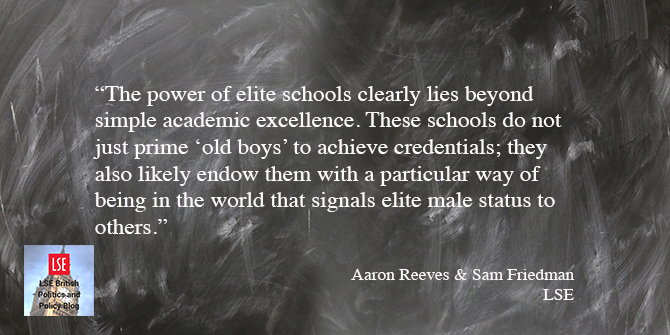 Recent terrorist attacks in Paris and Copenhagen have prompted some, including UKIP leader Nigel Farage, to point the finger at the supposed failure of multiculturalism. In this article, Caroline Howarth writes that these arguments by Farage and others are dangerous: they feed a powerful discourse that presents diversity, immigration and marginalised communities themselves as ‘the problem’, which may provoke hostility and violence.
Recent terrorist attacks in Paris and Copenhagen have prompted some, including UKIP leader Nigel Farage, to point the finger at the supposed failure of multiculturalism. In this article, Caroline Howarth writes that these arguments by Farage and others are dangerous: they feed a powerful discourse that presents diversity, immigration and marginalised communities themselves as ‘the problem’, which may provoke hostility and violence.
In the wake of the attacks in Paris what can we say about multiculturalism as a social policy and a social ideal? Just one day after the murders in Paris was Nigel Farage right to leap to the conclusion that multiculturalism has ‘encouraged people from other cultures to remain within those cultures and not integrate fully within our communities’? The insinuation from Farage is that because of a lack of cultural integration social distances between majority and minority groups in society widen to such an extent that there are increased hostile attitudes towards one another, intergroup tension, processes of dehumanisation and so the killing of others.
There is evidence from Political Psychology that does in fact support the claim that social distance between groups plays a factor in the development of extreme prejudice towards different groups and the possibility of political violence – and we see this both at the level of individuals who take up arms and commit violence in the name of their identities and the ideologies that bolster these, and also at the social level when whole societies participate in (or at least do not resist) widespread genocide, as we have seen in colonial genocides, Nazi Germany and in the former Yugoslavian states for instance.
It is crucially important to address social distances between the various cultural and religious groups that make up our super-diverse communities. However the way to do this is not through a rhetoric of community cohesion, assimilation and narrow forms of nationalism. It is not through the demands made of minoritised communities and individuals who are seen to represent them to integrate and adopt ‘our’ ways. And it is not even through this assertion of difference, segregation and distance between ‘us’ and ‘them’. Studies on multiculturalism demonstrate that a bottom-up and critical approach to diversity that does not focus on ‘respecting’, ‘tolerating’ or so reifying difference is productive in narrowing gaps between social groups. For instance, in a recent paper with Eleni Andreouli I argue that classroom activities that encourage children to think about what Britishness is for them, how they identify as national citizens and how they reject claims that they may not belong (as Black, Asian and Muslim British pupils for instance) are effective in provoking positive forms of national loyalty and citizenship.
Clearly multiculturalism did not work for the Kouachi brothers. But is that why they chose to kill 12 people on 7th January 2015? There was some initial analysis of their unhappy lives and a similar focus on mental health, family relationships and self-esteem as we saw with Anders Behring Breivik after he killed 80 people in Oslo in 2011. It would be re-assuring after such shocking atrocities to see political violence and radicalisation as products of individual pathologies. However it is important to recognise that the Kouachi brothers are heavily othered in these discussions: as Muslim, as black, as rejecting the “liberal” West and “our” way of life.
Social and Political Psychology shows that it is wider social and political factors that fuel such violence, and it is often feelings of discrimination and injustice that explain such hostility.Echoing textbook theories of extremism and political violence, some commentators (such as Juan Cole in Informed Consent) have argued that it is precisely because of a lack of political hostility on the part of French Muslims that led Al-Qaeda (through the Kouachi brothers) to target Paris as a means of heightening perceived discrimination towards French Muslims and so increase recruitment into violent politics. Ideologies of discrimination fuel collective political identities in ways that can become dangerous.
The arguments we see in Farage’s comments on this tragedy and elsewhere are also dangerous. They feed a powerful discourse that presents diversity, immigration and marginalised communities themselves as ‘the problem’ (as Professor of Social Psychology Steve Reicher argued recently at the LSE ), rather than a focus on what sustains social inequalities, racialized poverty and barriers to social inclusion. And they play into perceptions of discrimination, injustice and generally being let down by social and political institutions.
Multiculturalism as a policy of diversity management may have failed when it is about constructing reified differences between social groups and highlighting tensions between groups; but both as a lived reality of everyday life and as a policy of bottom-up approaches to inclusive and complex forms of identification and participation, it is alive and well. States may produce failed approaches to multiculturalism in ways that do lead to political violence, but here radicalisation stems from the failure of the state to absorb the demands of frustrated, marginalised groups. Hence we need to challenge those who claim that ‘Multiculturalism has failed’, as this assertion may itself play into the social and psychological dynamics that provoke political hostility and violence.
Note: This article gives the views of the author, and not the position of the British Politics and Policy blog, nor of the London School of Economics. Please read our comments policy before posting. Featured image credit:
 Caroline Howarth is Associate Professor in the Department of Social Psychology at the LSE.
Caroline Howarth is Associate Professor in the Department of Social Psychology at the LSE.








1 Comments